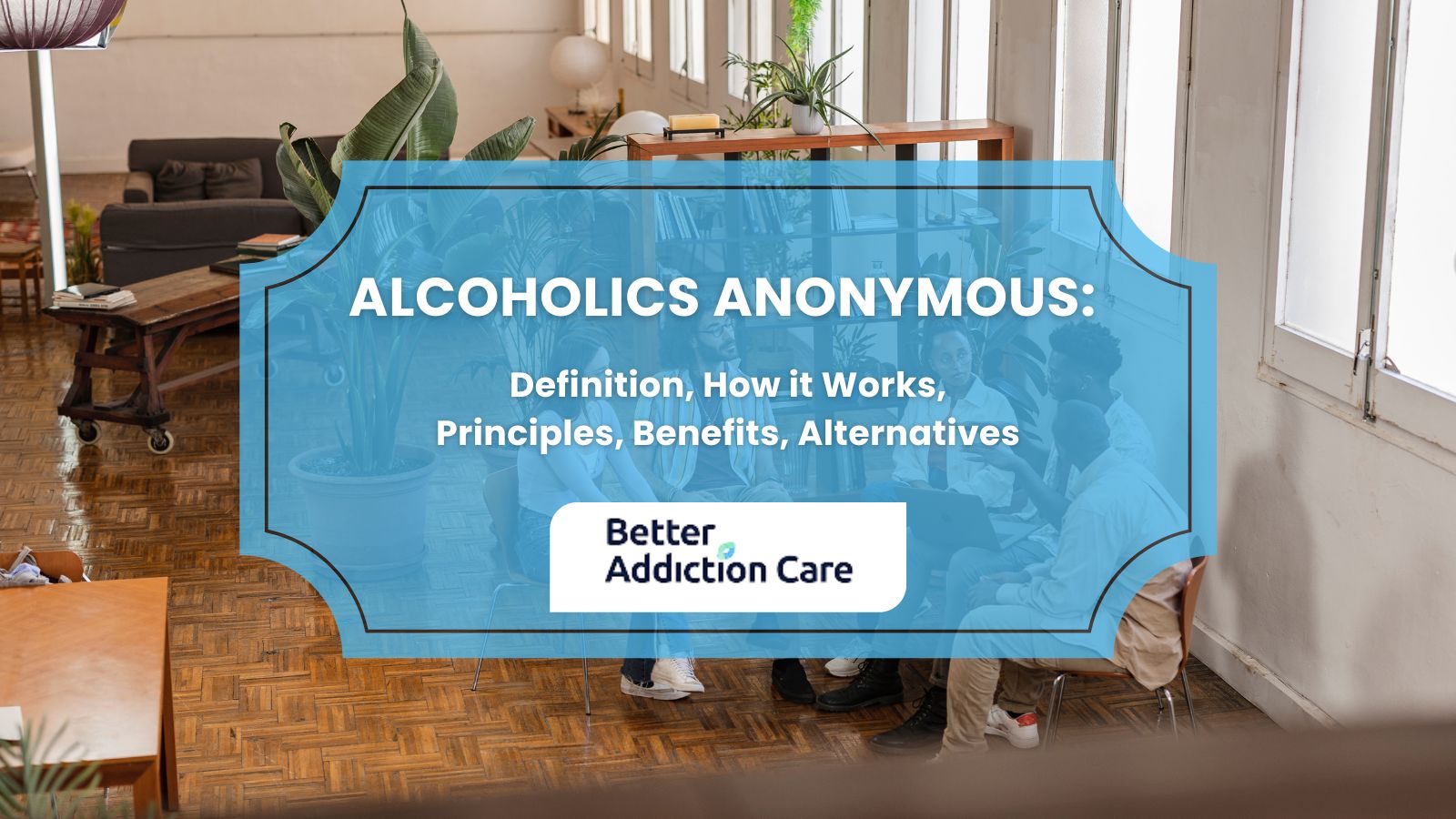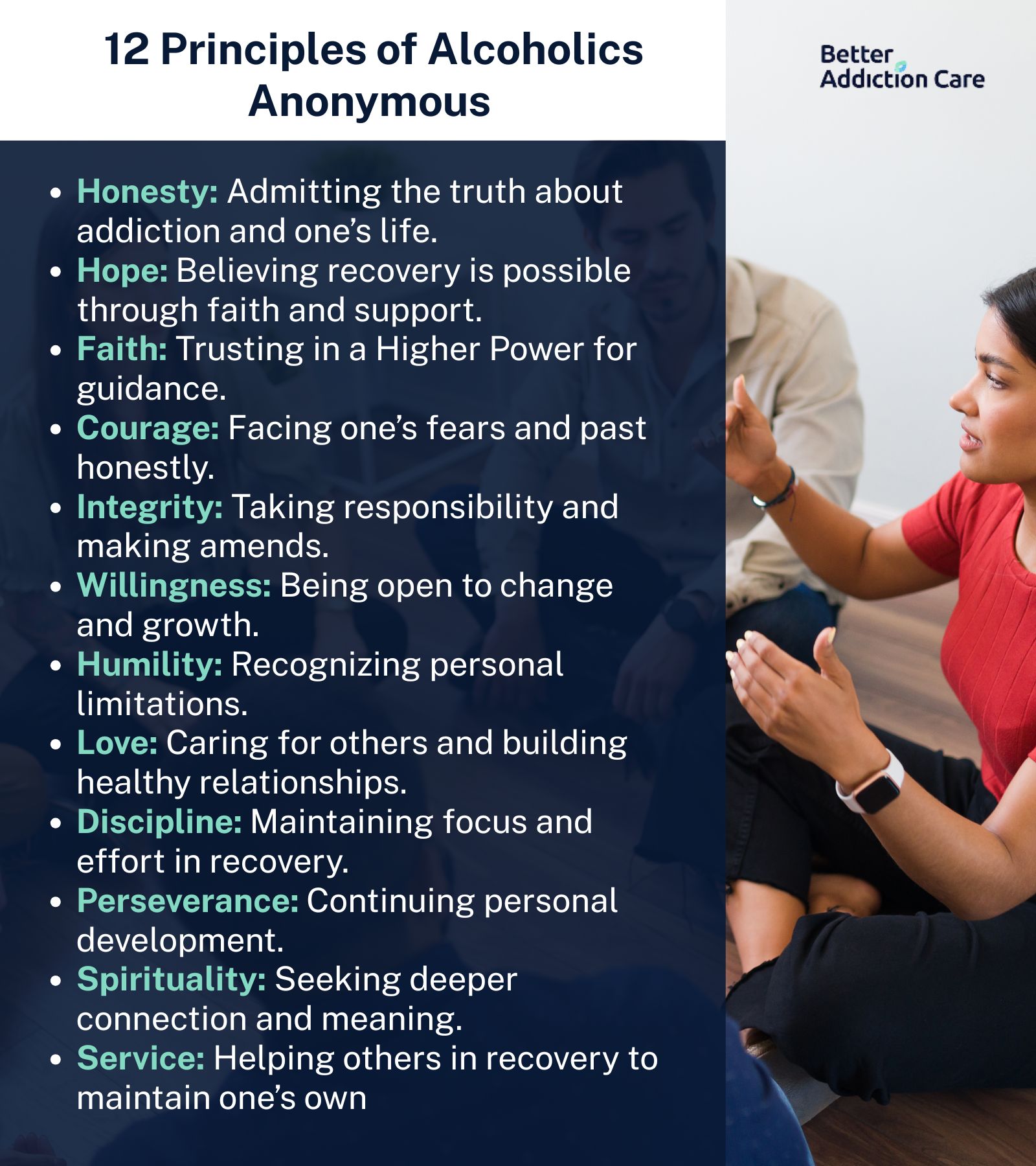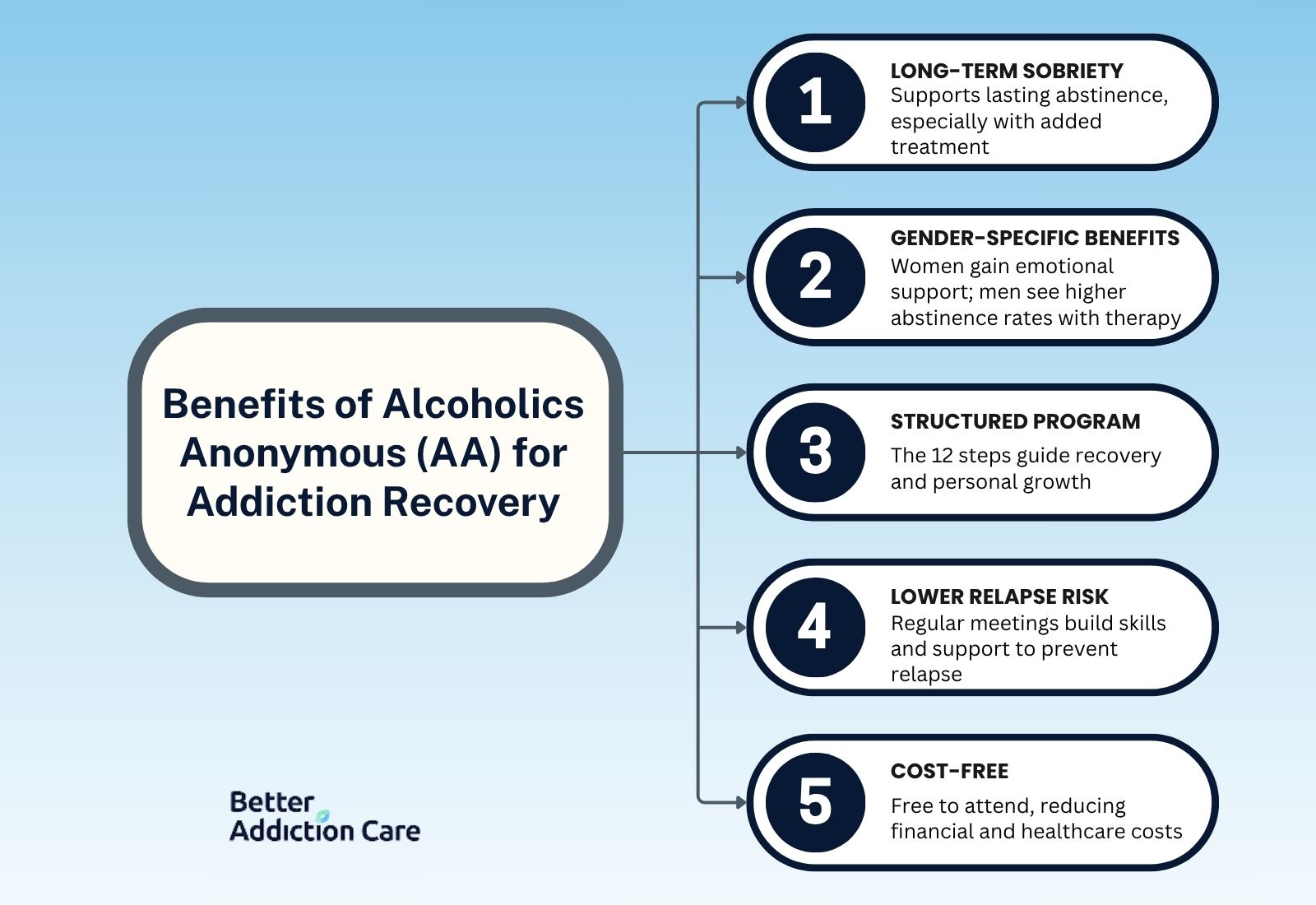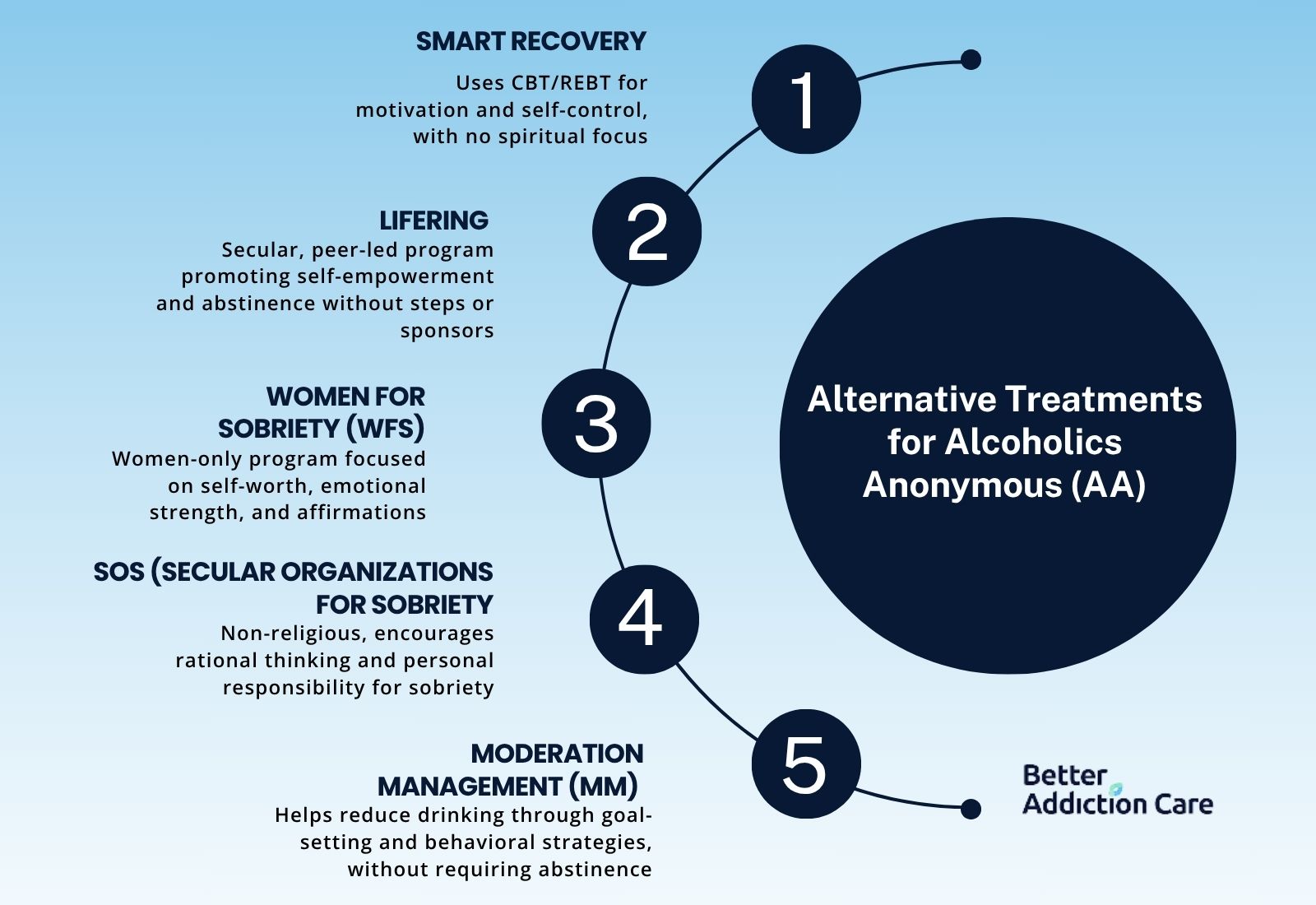Alcoholics Anonymous: Definition, How it Works, Principles, Benefits, Alternatives
Recovery is possible, and Alcoholics Anonymous (A.A.) has helped millions find lasting sobriety. A.A. is a global fellowship where people share their experiences and support each other in overcoming alcoholism.

It works through regular meetings and the Twelve Steps, encouraging personal growth, accountability, and spiritual reflection. A 2020 Cochrane review of 27 studies (~10,565 participants) showed AA and Twelve‑Step Facilitation (TSF) produced significantly higher continuous abstinence rates, 20–60% better than other evidence-based treatments, and also reduced healthcare costs.
Core principles include honesty, humility, service, and belief in a Higher Power (as personally understood). A.A. offers strong peer support, reduced isolation, and a structured path to long-term sobriety. For those seeking different paths, alternatives such as SMART Recovery, LifeRing, Women for Sobriety, and Refuge Recovery offer science-based or secular approaches, allowing individuals to choose what works best for them.
What is Alcoholics Anonymous?
Alcoholics Anonymous (A.A.) is a global support group that helps people recover from alcohol addiction through peer-led meetings and a 12-step program. The name emphasizes anonymity, allowing members to share openly without fear of judgment or stigma. A.A. stands for Alcoholics Anonymous, reflecting its confidential and inclusive nature.
A 2020 Cochrane review (Kelly et al.) found A.A. and Twelve-Step Facilitation to be more effective than other treatments for maintaining long-term sobriety, with added cost benefits. This supports A.A. as a scientifically backed recovery option.
What is the History of Alcoholics Anonymous?
Alcoholics Anonymous (A.A.) was founded in 1935 by Bill Wilson and Dr. Bob Smith in Akron, Ohio. Both were recovering alcoholics who discovered that sharing their experiences helped them stay sober. This led to the creation of a peer-support group focused on mutual recovery.
The main purpose of A.A. is to help individuals achieve and maintain sobriety through fellowship and the Twelve Steps, introduced in the 1939 book Alcoholics Anonymous. Today, A.A. operates globally, offering free, anonymous support for those struggling with alcohol addiction.
Why Is Anonymity Important In Alcoholics Anonymous?
Anonymity is important in Alcoholics Anonymous because it protects members' privacy and creates a safe, nonjudgmental space for open sharing. It allows individuals to speak honestly about their struggles without fear of stigma, discrimination, or social consequences. Anonymity also reinforces the idea of equality within the group; no member is more important than another, regardless of their background or status. This fosters humility and shifts the focus from personal identity to shared recovery. Additionally, anonymity helps safeguard the integrity of A.A. by discouraging members from using their association for personal gain or public recognition.
How Does Alcoholics Anonymous Work?
Alcoholics Anonymous works by providing a structured, peer-supported program that helps individuals achieve and maintain sobriety through regular meetings and the Twelve Steps. Members share their experiences, listen to others, and build accountability within a confidential and supportive environment.
The Twelve Steps guide individuals through a process of self-reflection, admitting powerlessness over alcohol, making amends, and developing a personal relationship with a Higher Power. Meetings are free, voluntary, and held worldwide, offering constant access to support. Sponsorship, one-on-one guidance from a more experienced member, is also a key feature, helping newcomers stay engaged and navigate recovery. By fostering community, responsibility, and spiritual growth, A.A. helps members break the cycle of addiction and build lasting change.
What are the 12 Principles of Alcoholics Anonymous?

The 12 principles of Alcoholics Anonymous are spiritual and moral guidelines that support personal growth and long-term recovery. They reflect the deeper values behind the Twelve Steps, helping individuals build a new way of living based on honesty, humility, and service. These principles are practiced daily and are vital to both personal transformation and helping others in recovery.
-
Honesty: Admitting the truth about addiction and one’s life.
-
Hope: Believing recovery is possible through faith and support.
-
Faith: Trusting in a Higher Power for guidance.
-
Courage: Facing one’s fears and past honestly.
-
Integrity: Taking responsibility and making amends.
-
Willingness: Being open to change and growth.
-
Humility: Recognizing personal limitations.
-
Love: Caring for others and building healthy relationships.
-
Discipline: Maintaining focus and effort in recovery.
-
Perseverance: Continuing personal development.
-
Spirituality: Seeking deeper connection and meaning.
-
Service: Helping others in recovery to maintain one’s own.
What Are the 12 Traditions of Alcoholics Anonymous?
The 12 Traditions of Alcoholics Anonymous are guiding principles that ensure the unity, stability, and integrity of the A.A. fellowship as a whole. While the Twelve Steps focus on individual recovery, the Traditions help A.A. groups function effectively and maintain their purpose without outside influence. These traditions promote humility, group autonomy, and service above self-interest.
The 12 Traditions of Alcoholics Anonymous are:
-
Our common welfare should come first; personal recovery depends upon A.A. unity.
-
For our group purpose, there is but one ultimate authority, a loving God as He expresses Himself in our group conscience.
-
The only requirement for A.A. membership is a desire to stop drinking.
-
Each group should be autonomous except in matters affecting other groups or A.A. as a whole.
-
Each group has but one primary purpose: to carry its message to the alcoholic who still suffers.
-
An A.A. group ought never endorse, finance, or lend the A.A. name to any related facility or outside enterprise.
-
Every A.A. group ought to be fully self-supporting, declining outside contributions.
-
Alcoholics Anonymous should remain forever nonprofessional, but our service centers employ special workers.
-
A.A., as such, ought never be organized, but we create service boards or committees directly responsible to those they serve.
-
Alcoholics Anonymous has no opinion on outside issues; hence, the A.A. name ought never be drawn into public controversy.
-
Our public relations policy is based on attraction rather than promotion.
-
Anonymity is the spiritual foundation of all our Traditions, ever reminding us to place principles before personalities.
What to Expect at an Alcoholics Anonymous Meeting?
Alcoholics Anonymous (A.A.) meetings are support sessions where individuals share experiences to help themselves and others stay sober. These meetings are held in community centers, churches, office buildings, treatment centers, and are also available as online meetings for remote access.
Meetings are usually led by A.A. members, not professionals, and last about 60 to 90 minutes. They occur daily or weekly, depending on the group. There are two types of meetings: open meetings, which welcome anyone (including friends and family), and closed meetings, limited to those with a desire to stop drinking. All meetings prioritize confidentiality and mutual support.
What is the Difference Between an Open and Closed Meeting in Alcoholics Anonymous?
The main difference between an open and closed Alcoholics Anonymous (A.A.) meeting lies in who can attend. An open meeting welcomes anyone interested in learning about A.A. or supporting a loved one, including friends, family members, and professionals. These meetings include personal stories and general information about recovery. In contrast, a closed meeting is reserved only for individuals who identify as having a drinking problem and are seeking help. This setting offers a more private and focused space for members to share honestly without outside observers. Both meeting types uphold A.A.’s core principles of anonymity, respect, and mutual support.
What is the Role of a Sponsor In Alcoholics Anonymous meetings?
The role of a sponsor in Alcoholics Anonymous (A.A.) is an experienced member who provides one-on-one guidance to a newer member, known as a sponsee. The sponsor's role is to offer support, accountability, and practical help in working through the Twelve Steps of recovery. While sponsors are not therapists or professionals, they share their own experiences and help sponsees navigate challenges in sobriety. Sponsors attend meetings with their sponsees, check in regularly, and serve as trusted mentors throughout the recovery process. This relationship fosters connection, trust, and personal growth, playing a key role in long-term sobriety.
What Are the Benefits of Alcoholics Anonymous?

The benefits of Alcoholics Anonymous are wide-ranging and supported by both personal experience and scientific research. A.A. offers a strong support system and a structured, step-by-step approach that helps individuals recover from alcohol addiction and maintain long-term sobriety. Its flexible, inclusive, and cost-free model makes it accessible to people from all walks of life.
The benefits of Alcoholics Anonymous are:
-
Long-Term Abstinence: Higher rates of sustained sobriety among regular A.A. participants.
-
Structured Program: The Twelve Steps provide clear guidance for personal growth and recovery.
-
Peer Support: Sharing experiences with others who understand fosters emotional healing and accountability.
-
Less Chance of Relapse: Regular meeting attendance and sponsor relationships reduce the risk of relapse.
-
Gender-Specific Benefits: Research indicates A.A. offers greater emotional and social support for women and stronger peer bonding for men.
-
Cost-Effective: A.A. is free, with no membership dues, reducing financial barriers to recovery.
-
Flexible Access: Offers both in-person and online meetings worldwide.
-
Anonymity and Safety: Encourages open sharing in a confidential setting.
-
Spiritual Growth: Supports emotional and spiritual development, tailored to individual beliefs.
-
Service Opportunities: Helping others in the program reinforces sobriety and purpose.
What Are the Challenges of Alcoholics Anonymous?
The challenges of Alcoholics Anonymous are important to consider, as the program does not suit everyone’s needs or beliefs. While A.A. has helped many, some individuals find aspects of the approach limiting or difficult to engage with. Understanding these challenges helps individuals make informed decisions about their recovery path.
The challenges of Alcoholics Anonymous are;
-
Spiritual Focus: The emphasis on a “Higher Power” does not resonate with atheists or agnostics.
-
Lack of Professional Guidance: Meetings are peer-led and not facilitated by trained professionals.
-
One-Size-Fits-All Approach: The Twelve Steps do not align with everyone’s recovery style.
-
Group Variability: Meeting quality and culture vary widely by location.
-
Anonymity Limitations: Anonymity reduces accountability in some cases.
-
Gender and Diversity Gaps: Some groups lack inclusivity or representation.
-
Resistance to Medication-Assisted Treatment (MAT): Some A.A. members discourage combining the program with medical treatment options.
What Are the Alternatives to Alcoholics Anonymous?

The alternative treatments to Alcoholics Anonymous are diverse and offer options for those who prefer secular, self-directed, or evidence-based approaches to recovery. These programs vary in philosophy and structure, but all aim to support individuals in overcoming alcohol addiction.
-
SMART Recovery: A science-based program that uses Cognitive Behavioral Therapy (CBT) and motivational techniques. It helps individuals manage cravings, build coping strategies, and maintain motivation without relying on spirituality or a Higher Power.
-
LifeRing Secular Recovery: Focuses on self-empowerment and peer support in a non-religious setting. LifeRing encourages participants to strengthen their “Sober Self” through open discussion and mutual encouragement.
-
Women for Sobriety (WFS): Designed specifically for women, this program promotes emotional growth, self-esteem, and empowerment through 13 affirmations. It emphasizes positive thinking and rebuilding identity beyond addiction.
-
Secular Organizations for Sobriety (SOS): Offers a rational, non-religious approach to recovery. SOS meetings are discussion-based and focus on personal responsibility and honest communication.
-
Moderation Management (MM): Aims to help individuals reduce harmful drinking rather than quit entirely. It offers tools for self-monitoring, goal-setting, and behavioral change, appealing to those who seek moderation over abstinence.
Does Alcoholics Anonymous Help Prevent Relapse?
Yes, Alcoholics Anonymous (A.A.) helps prevent relapse, especially with regular participation. A major 2020 Cochrane review led by Dr. John Kelly analyzed 27 studies involving over 10,000 participants and found that A.A. and Twelve-Step Facilitation (TSF) programs were more effective than other treatments in promoting continuous abstinence and reducing relapse rates. The review concluded that A.A. participants had higher rates of sustained sobriety and that its peer-support model contributed to long-term recovery.
The study also showed that A.A. was as effective or better than cognitive-behavioral therapy (CBT) and other clinical approaches, particularly when engagement was consistent. This evidence suggests that A.A.’s structure, based on regular meetings, peer accountability, sponsorship, and the Twelve Steps, offers strong protection against relapse for many individuals recovering from alcohol addiction.
Is Alcoholics Anonymous More Successful Than Drug Rehab?
Comparing success rates between Alcoholics Anonymous and drug rehab programs depends on how success is defined and measured. AA shows strong long-term outcomes for those who regularly participate. For example, a 16-year study by Moos & Moos found a 67% success rate among active AA members. Another study by Lee Ann Kaskutas (2009) showed that about 50% of AA participants remained sober at 1, 3, and 8 years—double the rate of formal therapy alone. While inpatient and outpatient rehab offer medical and psychological care, AA appears equally or more effective for many individuals when consistent engagement is maintained.
Who can join alcoholics anonymous?
Anyone with a desire to stop drinking can join Alcoholics Anonymous (A.A.), regardless of age, background, or severity of addiction. There are no membership fees, referrals, or formal requirements. A.A. welcomes all individuals who recognize they have a drinking problem and want support in achieving sobriety.
Is Alcoholics Anonymous only for Alcoholics?
No. Alcoholics Anonymous (AA) is not only for alcoholics; its foundational principles have inspired similar groups for other addictions. Many people with broader substance abuse issues attend AA due to accessibility and shared recovery support.
Is Alcoholics Anonymous religious?
No. Alcoholics Anonymous is spiritual rather than religious; it encourages belief in a "Higher Power," but doesn't define what that is. Members interpret this concept in personal, non-religious ways, and people of all faiths or none are welcome.
Is Alcoholics Anonymous free?
Yes. Alcoholics Anonymous is free to attend; there are no dues or fees for membership. It is self-supporting through voluntary contributions from members. Donations help cover costs like meeting space and literature.





